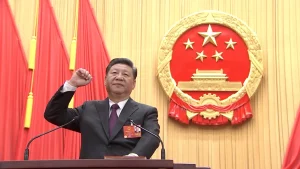Behind the Riots: How the West Is Digging Its Own Grave
Southport is located on the northern coast of the UK and has a population of nearly 95,000 residents, making it the third-largest population center in the Liverpool area of northwest England. Southport experienced a brief period of prosperity during the Victorian era. In 1848, a railway was introduced, and as a seaside town close to the industrial and trade hubs of Liverpool and Leeds, Southport quickly became a popular tourist destination.
Today, most of the town’s buildings are two-story terraced houses with red bricks and black roofs, reflecting the architectural style of Britain at the height of its empire. These were also the types of homes that most of the working class could afford at the time. However, as the industrial cities in the North rapidly declined in the latter half of the 20th century, Southport also gradually fell into quiet obscurity.
 Street view of Southport before the riots
Street view of Southport before the riots
This seemingly forgotten town has now become the epicenter of the most serious riots in the UK in over a decade. On July 29, a 17-year-old male stormed into a local dance studio armed with a knife and attacked the children present, resulting in the deaths of three children. The tragedy immediately sparked a wave of conspiracy theories and misinformation online. Although many accounts provided questionable information about the perpetrator’s identity, it did not prevent these false reports from spreading virally on social media. Western mainstream media attributes the riots to the rampant spread of this online misinformation. However, a common thread among these accounts is their deep resentment toward the woke culture currently being promoted in Western countries.
For instance, an X account named “Bernie (@Artemisfornow)” posted in the aftermath of the incident, alleging that the perpetrator was a Muslim immigrant and claiming that the UK government had been monitoring this person prior to the attack. Her previous posts have consistently expressed opposition to the political establishment, communism, China, immigration, COVID-19 prevention measures, vaccines, LGBTQ rights, and environmental movements, while also questioning global warming and advocating for extreme individual freedoms. In Bernie’s view, both the Labour and Conservative parties in the UK are perceived as globalists who disregard the will-being of British people. They introduced immigration policy that serve the interests of the establishment and use their positions in government to infringe upon individual freedoms. Essentially, Bernie represents a broader trend within the current anti-woke movement in the West.
 The information claiming that the perpetrator was Ali Al-Shakati is said to have originally come from an X account named Bernie
The information claiming that the perpetrator was Ali Al-Shakati is said to have originally come from an X account named Bernie
In media and academic discourse, individuals like Bernie are often labeled as right-wing populists. This categorization arises from their opposition to immigration and their promotion of individual freedoms, which align with traditional right-wing positions. Their rejection of identity politics and environmentalism, as advocated by left-libertarianism, along with their strong aversion to socialism, further reinforces this classification. However, their pronounced anti-globalist and anti-establishment stance suggests that they do not fully align with the traditional right-wing parties that typically advocate for free markets within Western parliamentary politics.
The emergence of the anti-woke movement is, in fact, a response to the perceived failures of traditional Western parliamentary systems. These systems, though imperfect, have long been considered the most effective model of governance, relying on multi-party competition to reconcile divisions, a rotation of power to ensure capable leadership, and the separation of powers, along with public oversight, to maintain justice and societal vitality. This idealized political system leads people to believe that future political organization merely needs to continually perfect this model of parliamentary democracy.
Such entrenched political bias is ubiquitous even within the anti-woke movement. For example, opponents believe that traditional parliamentary parties, regardless of how they label themselves, are all fundamentally aligned in serving the interests of the elite group. Conversely, they argue that only direct votes, such as the Brexit referendum, truly reflect the democratic will. Furthermore, mainstream media are perceived as controlled by globalists, with only truly independent media considered credible. They also accuse the government of betraying democracy by colluding with the establishment, leading them to conclude that people can only trust themselves.
Apparently both traditional Western liberal politics and the current anti-woke movement share a foundational belief in individualism. It highlights that atomized individuals are the basic units of political and social organization. In this view, society is merely an aggregation of these basic units which cannot be further divided.
Traditional Western liberal politics assumes that atomized individuals possess a set of inalienable rights. Consequently, society is viewed as being constructed through the transfer and collision of these rights. Idealized politics seeks to mediate the conflicts arising from this process by implementing institutionalized rules to better integrate, coordinate, and allocate these inalienable rights. Inevitably, this requires the regulation and discipline of individuals, which constitutes the fundamental role of government.
If Western parliamentary politics represents an attempt to sustain this idealized individual freedom through institutional means, then the anti-woke movement is an effort to reclaim individual freedom for oneself. It is fundamentally a product of Western individualist politics. Whether it manifests as white supremacy, cultural conservatism, nativism, or more extreme forms like Nazism, Zionism, or imperialism, these ideologies are marked by an extreme focus on self-interest. In other words, they emphasize “our race,” “our culture,” or “our nation,” all of which are rooted in extreme individualism.
While individualism once played a crucial role in the Western history, freeing society from religious and feudal oppression, it also harbors a significant dark side, including isolation, exclusivity, self-interest, suspicion, arrogance, and blind faith. The anti-woke movement today, rather than being labeled right-wing populism, might more accurately be described as the contemporary manifestation of extreme individualist politics in various Western nations.
The rise of the anti-woke movement is a tangible expression of the paradox inherent in Western individualist politics: a self-interest-centered politics cannot effectively ensure that political parties truly represent their constituencies, a failure often masked by other fragmented issues.
 Florida’s governor Ron DeSantis addresses the crowd before signing a bill dubbed the Stop Woke Act
Florida’s governor Ron DeSantis addresses the crowd before signing a bill dubbed the Stop Woke Act
Economic development is the primary issue. When these nations could temporarily buy public satisfaction through external colonization or financial expansion, the crisis of representativeness was suspended. However, when economic development encounters cyclical recessions, and existing expansion strategies fail to mitigate the resulting burden, social conflict emerges. Common political strategies include forming new parties, further fragmenting society by different interest demands, or introducing new issues to temporarily mask the crisis of representativeness.
At the backdrop of this cyclical economic downturn, the immigration issue currently troubling the UK and other Western capitalist countries is used as a temporary distraction from the deeper crisis of parliamentary representativeness. Statistics reveal that in 1997, when Tony Blair’s New Labour came to power, only 3% of the public considered immigration a significant concern. By 2016, when David Cameron’s Conservative Party announced the Brexit referendum, this figure had risen to 48%. Both parties have since made immigration a central issue to attract voters.
It is noteworthy that while both parties actively promoted stricter immigration policies, few have mentioned the key events that triggered the immigration wave of the 1990s—Western military interventions in Africa, Asia, and Latin America, as well as the neoliberal reforms pushed globally. These were made possible through the joint support and active promotion of major parliamentary parties in Western countries.
During this era, Western nations paved the way for neoliberal globalization through military interventions and conditional economic aid, which also created a large number of refugees and facilitated mass economic migration from the Global South to the Global North. At the same time, regardless of which party was in power, both the UK and the US aggressively pursued neoliberal economic policies, weakening trade unions, privatizing public services, introducing cheap immigrant labor to reduce costs, and relocating manufacturing industries to developing countries.
In the short term, this created the illusion of rapid economic growth and reduced living costs but also sowed the seeds of severe resource concentration, extreme wealth disparity, and widespread unemployment among industrial workers. Today, many of those participating in anti-immigrant protests are unemployed youth who also form the core of England’s football hooligan groups and are active in anti-immigrant and anti-LGBTQ movements. Many of their parents were formerly steelworkers, miners, and manufacturing workers in northern England and Wales. In this context, the liberal politics established by the West have ultimately become the very rope leading to their own demise.
 Rioters throw a garbage bin on fire outside a hotel in Rotherham, Britain.
Rioters throw a garbage bin on fire outside a hotel in Rotherham, Britain.
Although the anti-immigrant protests sparked by the Southport incident have not reached the previously predicted scale, the conflict between anti-immigrant and anti-anti-immigrant factions in the UK has officially moved from online disputes to physical confrontations. The rift in individualist politics, exacerbated by the woke culture movement and the anti-woke culture movement, has also spread to multiple layers of political and social life.
In the United States, we have seen this with the election of Trump; in the UK, with Brexit; in Germany, with the rise of the Alternative for Germany party; and in France, the Netherlands, Belgium, Italy, and Spain, where anti-EU and anti-globalization political forces have rapidly gained significant influence. The emergence of these ideologies does not reconcile social conflicts; instead, it exacerbates fundamental social divisions. Among them, policy proposals may vary, and some even express a desire for closer ties with China. However, it must be recognized that these political products of extreme individualism, from their own perspectives, uniformly view China as a model of racial purity, administrative efficiency, and anti-LGBTQ.
China’s modernization and development cannot be forcibly framed within this individualist anti-woke culture discourse. The events unfolding in the UK and across Western societies today remind us that we must break free from the epistemological traps of individualism and hegemonic centrism, explore autonomous knowledge systems, and use these to understand China’s modernization experience, China’s relationship with the world, and China’s history and present. On this basis, we can envision a truly different future for humanity.
Editor: Li Jingyi




